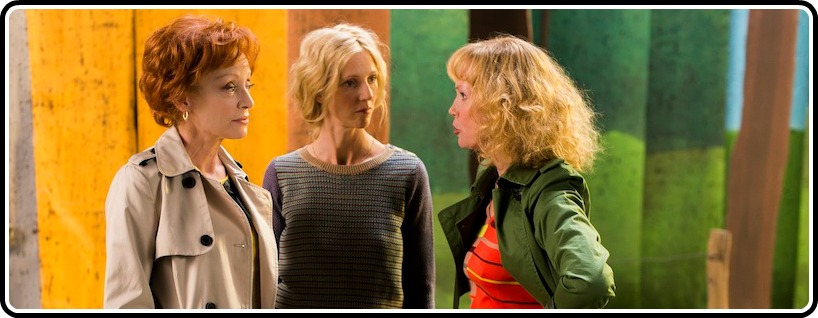
Life of Riley—adapted from playwright Alan Ayckbourn’s play of the same name—is legendary French filmmaker Alain Resnais’ final film, and yet it has enough joie de vivre throughout to suggest that it isn’t so much an end to a more than 60-year career as it is a representative celebration of the ways in which the filmmaker experimented and played with form throughout his entire life. Known by Criterion collectors for his more dour and austere films like Last Year at Marienbad or Hiroshima Mon Amour, here Resnais ebulliently frees himself from the constraints of story and solemn configurations to produce a freewheeling, intentionally stagey comedy that will still most likely not win over any newcomers. Instead, Life of Riley’s ethos is a steadfast Resnais study in metatextual comedic behavior that embraces its own kookiness about a twisty tale of plucky marital turmoil.
Save for a few repeated insert shots done on location and a set of pen and ink illustrations that intercut the action, the film is set entirely within the confines of a group of soundstages meant to stand-in for England’s Northern countryside. The exaggerated sets—most of which are simply painted and dressed with cardboard cutouts of shrubbery or other objects in the foreground—are a bit off-putting at first due to their obvious theatricality, and the simple repetition to mark the passing of time may be tedious to some. But the affected scenery slowly blends into the proceedings as viewers are able to settle down and accept the not-so-merry band of characters darting in and out of scene after scene.
Those hyperactive characters are comprised of a group of three couples, all amateur thespians that are apart of a community theater performance of Ayckbourn’s own real-life 1969 farce, “Relatively Speaking.” Kathryn (played by Resnais’ effervescent wife and frequent muse, Sabine Azema) and her stuffy doctor husband Colin (Hippolyte Girardot), find out their close friend, the Godot-like titular character George Riley who never appears onscreen, is dying of terminal cancer. They soon tell George’s best and oldest friend, the smug businessman Jack (Michel Vuillermoz), and his fretful wife Tamara (Caroline Silhol) of the troubling news. Jack is so distraught that he drops out of the play, and the two ladies soon suggest George as his replacement, a puzzling proposition until we find out the two women have other reasons to keep the dying man company. The last couple is George’s estranged and fragile wife Monica (Sandrine Kiberlain) and her new beau, a retired and sometimes volatile farmer named Simeon (Andre Dussolier).
Vuillermoz, whose Jack is swiftly pushed out of his stern quotidian life, brings a real tenor to the character that grounds him beyond the melodrama, but it is Azema’s firecracker of a character is the highlight here. To watch her become more and more absurd like a busy bee who’s suddenly found a bounty of honey it a great delight.
Each high-strung character spends the film buzzing around Riley’s invisible narrative nucleus, and is forced to reexamine their relationships with each other that Resnais meticulously frames in both the expansive performative spaces and intimate close-ups. For the more immediate shots, the characters are dropped into an even more artificial background of a blank white surface covered in criss-crossed black lines that suggest something like Roy Lichtenstein’s comic book-inspired Pop art.
The artificiality of the film itself and the histrionic dialogue tend to always serve the characters themselves, but the experimentation does seem over the top at times if not a bit unnecessary. Why not just put on a theatrical run of the play in a playhouse somewhere instead of relying on such techniques that seem like a better fit for the stage? Still, there is something to be said about the film’s playfulness and the buffoonery it values above any other expectations you may have for it. The fact that the plot is wrapped up without very much trouble isn’t bothersome because the movie moves with a magnetic levity, and is never too overbearing with its thematic elements.
The fact that Life of Riley ends with a funeral is appropriate not only for the story but also—morbidly enough—for Resnais because it offers itself as a sincerely fond farewell. The characters go their separate ways into the ether and you get the sense that Resnais has too. He’s left an indelible mark on international cinema, and to see him continuously experimenting all the way until his final outing is a fitting end to that hugely important body of work. His final film may seem too insignificant and pointlessly theatrical to some, but others will find its lightheartedness an enjoyable and affirming time after the lights have gone up.



![Bergman Island (The Criterion Collection) [Blu-ray]](https://criterioncast.com/wp-content/uploads/2022/11/bergman-island-the-criterion-collection-blu-ray-400x496.jpg)
![This Is Not a Burial, It’s a Resurrection (The Criterion Collection) [Blu-ray]](https://criterioncast.com/wp-content/uploads/2022/11/this-is-not-a-burial-its-a-resurrection-the-criterion-collection-blu-ray-400x496.jpg)
![Lars von Trier's Europe Trilogy (The Criterion Collection) [The Element of Crime/Epidemic/Europa] [Blu-ray]](https://criterioncast.com/wp-content/uploads/2022/11/lars-von-triers-europe-trilogy-the-criterion-collection-the-element-of-400x496.jpg)
![Imitation of Life (The Criterion Collection) [Blu-ray]](https://criterioncast.com/wp-content/uploads/2022/11/imitation-of-life-the-criterion-collection-blu-ray-400x496.jpg)
![The Adventures of Baron Munchausen (The Criterion Collection) [4K UHD]](https://criterioncast.com/wp-content/uploads/2022/11/the-adventures-of-baron-munchausen-the-criterion-collection-4k-uhd-400x496.jpg)
![Cooley High [Criterion Collection] [Blu-ray] [1975]](https://criterioncast.com/wp-content/uploads/2022/11/cooley-high-criterion-collection-blu-ray-1975-400x496.jpg)